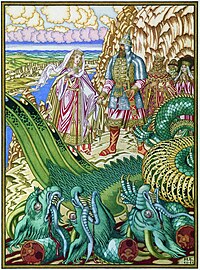
Back Портал:Фентъзи Bulgarian Wikiproyecto:Literatura fantástica Spanish Portale:Fantasy Italian Portaal:Fantasy Dutch Portal:Fantasy Polish Портал:Фэнтези Russian Портал:Фентезі Ukrainian

Selected fantasy workCarnivàle /kɑːrnɪˈvæl/ is an American television series set in the United States during the Great Depression and Dust Bowl. In tracing the lives of two disparate groups of people, its overarching story depicts the battle between good and evil and the struggle between free will and destiny; the storyline mixes Christian theology with gnosticism and Masonic lore, particularly that of the Knights Templar. The show was filmed in Santa Clarita, California, and other Southern Californian locations. Carnivàle was produced by HBO and ran for two seasons between September 14, 2003 and March 27, 2005. The show was created by Daniel Knauf, who also served as executive producer with Ronald D. Moore and Howard Klein. The incidental music was composed by Jeff Beal. Nick Stahl and Clancy Brown starred as Ben Hawkins and Brother Justin Crowe, respectively. Early reviews praised the style of Carnivàle but questioned the approach and execution of the story. Carnivàle's first episode set a new audience record for an HBO original series, but the show was unable to retain its ratings in its second season. Carnivàle was canceled after 24 episodes, cutting its intended six-season run short by four seasons. The show won five Emmys in 2004, was nominated for 10 further Emmy awards, and received numerous other nominations and industry awards between 2004 and 2006. Fantasy topics
Related Portals |
